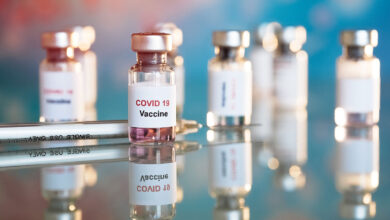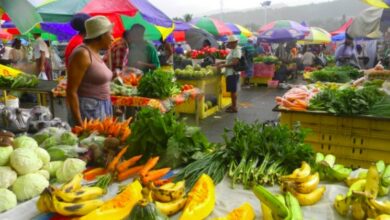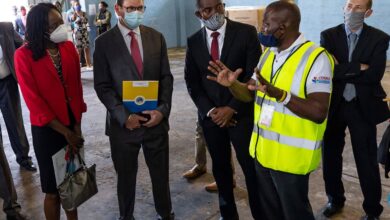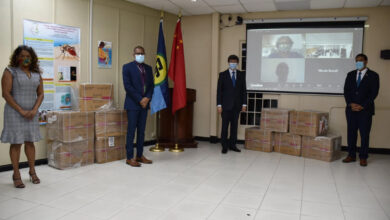“The Caribbean region’s economies ranks among the most travel and tourism- dependent economies in the world. This has exposed our people and our economies in a way that we have not experienced since becoming independent nations more than fifty years ago in some instances.”
The full address:
ADDRESS TO THE 73rd WORLD HEALTH ASSEMBLY by THE HONOURABLE MIA MOTTLEY, PRIME MINISTER OF BARBADOS and the CHAIR OF THE CONFERENCE OF HEADS OF GOVERNMENT OF CARICOM
Today, I join with defenders of democracy across the Caribbean Community region, the wider Americas, and indeed the Small Island Developing States of the world who recognise the importance of fearless, robust leadership.
I speak to you from this region of the Caribbean, CARICOM as we are known, a region that is characterised by developing health systems that suffer from the same vulnerabilities as many of our countries. Low numbers of ICU beds per capita, few intensivist doctors and critical care nurses, few ventilators per capita. And regrettably, our people have a higher rate of NCDs and obesity than we would like.
We have watched how COVID decimated rich and powerful nations with strong curative care systems – killing their people, over running their health care systems, and halting business.
And so early on, CARICOM decided that we cannot fight the illness, and that we had to delay the arrival of COVID-19 into the region as far as possible.
We mobilized all of our regional agencies those that dealt with public health like the Caribbean Public Health Agency (CARPHA) or the modelling like the University of the West Indies, or with our disaster preparedness and mitigation like CDEMA and tracking the movement of persons through our borders like the Joint Regional Communications Centre (JRCC) of CARICOM.
The Caribbean region’s economies ranks among the most travel and tourism- dependent economies in the world. This has exposed our people and our economies in a way that we have not experienced since becoming independent nations more than fifty years ago in some instances.
In our own case in Barbados, our Emergency Operations Centre in the Ministry of Health, has been functioning since mid-January. We reorganised our health systems to improve access to health service for COVID-19 patients, while at the same time reducing the risk of exposure for the most vulnerable populations through reduced movement from as early as February of this year. We repurposed an abandoned naval base into a facility for COVID patients. This expanded our access to critical care beds by over 300%. Fortunately, our investment in and the preparedness of our public health officials over the decades has permitted us to do the type of public health surveillance to detect cases, trace and quarantine contacts, isolate and treat the ill. You will forgive me if I use this opportunity to salute the public health pioneers of the Caribbean over the last seven decades. They have been true heroes to our people.
CARICOM Heads of Government adopted a ‘whole of government’ and ‘whole of society’ approach.
In addition, we reached out to our Caribbean neighbour Cuba and received hundreds of doctors and nurses to help us. I take this opportunity to thank our brothers and sisters in Cuba and the Government of the Republic of Cuba, in particular, for its unswerving assistance during this pandemic. It has been palpable and clear to all of our populations.
So, our CARICOM family banded together to lock down and ride out this first wave and it has been a long and treacherous wave.
The closing of our borders and the trebling of unemployment and the reduction in our Government revenues by half, have created grave challenges for many of us.
Similarly, the psyche of people in our hemisphere has been disturbed.
For the majority of persons under age 70 in the Caribbean, many of whom have never had to confront grave challenges, the world appears to be on auto pilot. They wonder who is in control and where is the leadership, where is the global cooperation that they so expected. And for too many of our citizens globally, life has become a game of roulette betting on numbers and colours and ignoring the science that needs to underpin our actions.
Nations rich and poor are seeking inspiration.
This is a crisis therefore that strikes not only at the heart of our humanity but also at the organisation of our human societies.
It is a crisis that calls for global leadership that will allow us to rebuild our humanity, our environment and the equity so badly needed in our societies and our economies. COVID has brought many of us closer than we have been with each other; it has equally cast a brighter light on the inequities in our society, but then it has also allowed the earth to breathe – yet again.
It is why we have contended that nothing short of coordinated global leadership, not just of governments, but also from people of influence whether from the religious or faith-based organisations or in other areas of the society that they ought to be involved. We need a global leadership initiative that is rooted in moral leadership more so than ever.
Moral leadership that recognizes that 75 years after the United Nations was formed it is not good enough for us to accept that people or countries can fall through the cracks. That in particular as we reflect on the events of the last three months were it not for Pan-American Health Organisation (PAHO), or CARPHA, the Caribbean Public Health Agency and more recently the WHO, we would believe that we were living in the “wild wild west” that we see in movies where only those who are strong and well-endowed should survive. It is the intervening hand of these agencies that I just mentioned, that has sought to move us as a region, closer to a level playing field but my friends there is still much work to be done.
Moral leadership that will finally recognize that the use of historic per capita income to determine access to concessional funds or grant funds, or indeed as I mentioned earlier to determine fair access to the procurement of goods is unacceptable. As I have said many times it is the equivalent of taking my blood pressure reading from two years ago and using it today, to determine my vulnerability to a stroke – a completely useless exercise.
Even when our circumstances deteriorate, there has been no review that takes into account the inherent vulnerability to which we are exposed and which prevents us from being able to access critical money or goods. In addition, the use of certain proxy criteria to access technologies, medicines, vaccines or concessional funds and grants, would exclude vulnerable countries such as ours in the Caribbean, some in Latin America and even in the Pacific. Why? Because we are using criteria that are more relevant to fighting problems that have little or no relevance to our current vulnerabilities and challenges. For example, we are less than two weeks away from the beginning of the hurricane season. Tropical Storm Arthur has already formed off The Bahamas, well in advance of that start. Many of us are already confronting droughts and the presence of Sargassum weed as the result of the climate crisis and it is wreaking havoc in our societies.
But none of these challenges are captured by per capita income or by maternal mortality rates. None of them.
In addition, where there is global market failure as is happening now, small middle income states are at risk of not being seen or heard or not even accessing critical goods and supplies. I take this opportunity to thank Dr. Tedros for reaching out to the Executive Director of the Global Fund last evening, to advocate for the countries in the region that have been excluded from procurement through the consortium of critical COVID-19 medical supplies. We need to be included.
It is also therefore clear, that we need therefore additional criteria to determine equitable access and fair allocation – criteria that better take into account that vulnerability which we have. And if we are asking for the same solution for climate, external shocks as we are now asking for the pandemic, it is because all three destroy our capacity to produce as nations and the ability of our people to survive.
It is against this background my friends, that equitable access and fair allocation of resources will allow our small states, particularly middle income ones, dependent on travel to be able to have access to increased supplies for testing such that we can reopen our societies safely to intra-regional travel and, thereafter, to extra-regional travel. But it will also better allow us to ensure that there is a return to safe work, by safe people, the least vulnerable people to COVID-19 in our countries. While we can tolerate high unemployment and severe contraction of our economies for 2 or 3 months, the consequences to our societies of prolonged shutdown are as equal as the high incidence of COVID among our population. That is why we need urgently, to get access to adequate numbers of the appropriate tests in particular the rapid tests that are affordable and reliable if we are to allow our economies and societies to reopen safely.
Our small states have been suffering from high debt and low growth for decades. We believe that there should also be mature and relevant conversations for middle income, small island developing states across the globe especially as it relates to our debt obligations in the midst of this pandemic. Many countries will either have an orderly restructuring of debt or at the very least a debt moratorium that provides certainty for both the borrower and the lender, or they will have a disorderly unravelling that will create a crisis both within their respective countries and within the global financial markets. These conversations must admit of greater certainty in the management of our affairs and I pray that the global community will have the courage to allow us to have them.
I say so conscious that Barbados took a major leap of faith when we restructured our debt in the last 18 months to include natural disaster clauses in our domestic and external debt instruments that provide for greater fiscal space to be created through a moratorium on the payment of principal and a capitalization of the interest should we face a natural disaster event. The certainty that these natural disaster clauses provide is increased fiscal space. Were this provision available in the context of this pandemic, it would bring tremendous relief to those countries and better position many of us to rebuild in a post-COVID-19 environment.
Let me at this juncture express my appreciation to Director General Dr. Tedros and the WHO for the recent appointments of Sir Andrew Witty and Dr. Ngozi Okonjo-Iweala, a dear friend of the Caribbean, as Special Envoys for the north and south respectively for the WHO’s Access to COVID-19 Tools (ACT) Accelerator. It is intended that they will ensure that there is a framework for equitable access to tests, therapeutics and a vaccine, if there is ever one. In addition, our Caribbean countries salute your inclusive leadership and recognize that without your timely interventions the efforts of PAHO and CARPHA would be stymied as we try to meet the needs of our populations.
Forty-two years on, our Community still believes that the principles of Alma Ata must mean something:
- That we should have equitable access to the supplies we need,
- That we should be able to afford to save the lives of our citizens, and
- That solutions should be appropriate to our context.
I must add at this point that global moral leadership also means that in aid of supporting human lives, which none of us can replace, that there ought to be a suspension of international sanctions imposed against countries. Whatever differences or difficulties we may have with each other, they can be put on pause while we wrestle to the ground this awful pandemic for wherever it exists, it affects each and every one of us.
My friends, there was life before COVID-19 and I know that there will be life after COVID-19. For this reason, even with the pandemic we must not drop the ball on those other global health priorities that are critical to our overall development. I refer specifically to the chronic NCDs – the silent killers (diabetes and cardiovascular disease, hypertension). I refer to HIV and AIDS and to the antimicrobial resistance that we are fighting and the other health-related diseases that come as a result of the climate crisis. For our populations these challenges remain real and continue to present a silent but real and present danger.
Let us use the cooperation we are trying to build to also help fight these challenges. Why? Because solidarity, unity and partnership remain enduring principles for us. These are the principles that led our Caribbean countries to embrace the pursuit of democracy in the late 1930s. Just as they also were the principles that helped the world rebuild after three decades of challenges 75 years ago with the formation of the United Nations and the Bretton Woods institutions. I pray that we will have the fortitude to fight against these challenges of our times, relying on these same principles of solidarity, unity and partnership. I wish the leadership and management of the World Health Organisation, success in its efforts to promote health, to keep the world safe and to serve the vulnerable people of our world as it is required to do. Your mission 73 years on, after your formation remains critical.
I say to you as I leave, the world watches on with bated breath!
We wish you all of the very best as you deliberate over these two days for so much depends on it.
Thank you.






